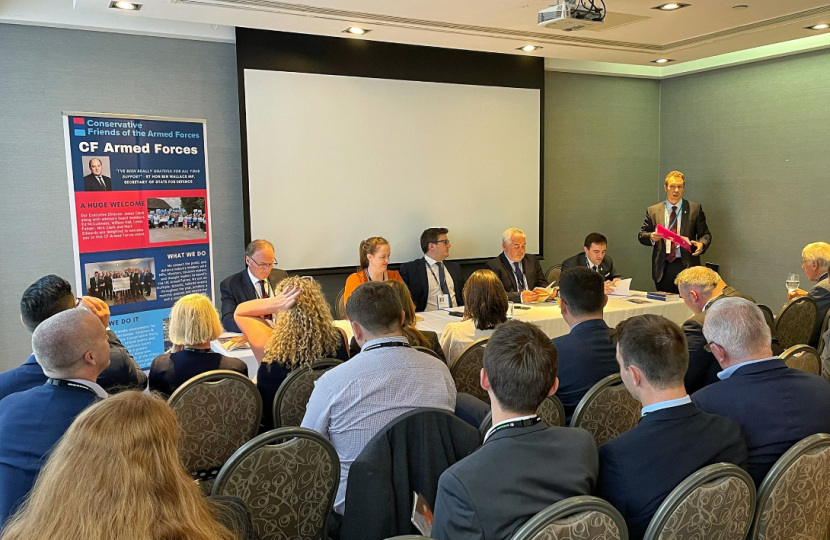
Ed McGuinness gave an overview of his Policy idea at the CFArmedForces Policy Pamphlet launch at the Conservative Party Conference 2022.
Ed McGuinness is the Operations Lead for CF Armed Forces. He spent six years in the British Army, including a tour of Afghanistan, and leading soldiers in Africa, the Far East and North America. His post military career has been in global finance as an investment analyst and he has held various positions in the Conservative voluntary Party.
The Conservatives have always been the Party of Defence and have advanced the causes of the military and veterans over our time in government. However, there is always an opportunity to improve that effort and address new and emerging challenges when it comes to supporting our service personnel after their immediate service has ended.
This paper seeks to highlight some of the challenges that exist due to the nature of what being a veteran is and the culture of our nation when it comes to the military.
INTRODUCTION
There are three main phases to a service person’s life; Basic training when a service person is a trainee, general duties and operations when a service person is a fully trained and resettlement & the future when a service person becomes a veteran.
The first two of these phases are catered for in a substantial manner. We have some of the finest training establishments in the world, our support to our servicemen and women through accommodation, food, deployment bonuses, family support and education is excellent – although it should be noted there will always be notable and unacceptable oversights. However, our veteran support, at least as far as central government is concerned, can always improve.
The Government has made great strides in this field. The Office of Veteran’s Affairs, which sits within the Cabinet Office, was only established in 2019 – in contrast to the US Department of Veterans Affairs, a full department in itself, which has been in existence since 1989. It is also unfair to equate the United Kingdom’s relationship between its civilian population and its military with that of other countries so comparison (despite the prior exposition) could be less relevant but is included nonetheless and will be addressed in more detail below. The culture of civic society in the United Kingdom however is deeply rooted and can be harnessed to enhance the support to veterans without significant increases in spending.
WHY VETERANS NEED SUPPORT
Prior to launching into some of the key challenges and proposals for solutions it is worth asking why we should support veterans when they decide to leave service. It can be a taboo subject, but in a democracy it is always worth asking why certain groups or individuals require additional or different support from the state than others.
The expansion of the welfare state, and the basis on which it still stands today, which supported much of post-WW2 reconstruction was based on The Beveridge Report which identified ‘five giants on the road to post-war reconstruction’ – Want, Disease, Ignorance, Squalor and Idleness.1 This report, although written by the Liberal economist William Beveridge, was adopted by the wartime coalition government led by Churchill, initially implemented by the Atlee administration before subsequent consolidation and growth under a number of future governments (of varying colour). It is therefore understood that these principles hold for the purpose of government when it comes to protecting its most vulnerable via the welfare state.
However, does this apply to veterans? On the one hand service life equips a soldier with essential needs including gainful employment (want and idleness), dedicated healthcare (disease), an education and skills (ignorance) and basic necessities (squalor). Therefore the military, in itself provides the support emblematic of the welfare state. The reason for this is not because the military needs to support its service personnel in the same way as the welfare state supports the disadvantaged but that the military demands such service and sacrifice such that it is a requirement to ensure its people are fit to deploy and not buffeted by externalities experienced by others in society who are more free to manage those externalities on an individual basis. To that end the military does have an additional duty, given that it has asked its people to sacrifice a more normal societal role, to ensure that they are equipped to integrate into society upon completion of service. In short, we argue, no other public service demands as much from its people and therefore it has a duty to provide for those people even after service has completed.
CHALLENGES
There are two key challenges when it comes to veterans support. The first is the unique nature of the needs of veterans. The range of issues veterans require support for is almost as varied as each individual. Veteran care ranges from highly specific targeted needs such as mental and physical injury care, through to wider support such as resettlement assistance and post-employment training. By its very definition central government must set top level priorities, a general sense of direction and a consistent strategy – however it does not have the time or the resource to ensure each individual is catered for. In a sense it must exercise mission command to be successful.2
The second challenge is that the United Kingdom does not have a marshal tradition. Historically, the United Kingdom has maintained a small standing army, a larger navy and an air force of varying size (given its relatively recent history). The country, rightly so, has a principle of civilian primacy. Even in high profile instances of the use of the military in support of the civilian authorities military power is, rightly, highly targeted and used for the minimal amount of time.3 The public, of course, has a largely positive view of the military however, given they do not see the benefits of Defence on their day to day lives, there is not an ingrained culture of focus on military affairs, outside of crisis periods. We can contrast this with the US which has a strong marshal tradition – largely as a result of history (multiple, large scale interventions in the 20th century; Korea, Vietnam, Iraq & Balkans) and structures (an elected, and very visible, Commander-in-Chief, many of whom have openly courted positive press when related to the military). This challenge is not suggesting the United Kingdom ought to adopt a more US style culture, but seeks to illustrate comparisons when it comes to the US, of large scale support structures; one, would take significant resource to establish (not necessarily a bad thing) and, two, may not be appropriate for our attitudes in the United Kingdom.
This is a Conservative Friends of the Armed Forces policy pamphlet so in order to address these key challenges we will not simply argue for more resource. There are already structures in place which have led to great strides in the field of veterans affairs, not least, as previously mentioned, the establishment of the Office for Veterans Affairs, however structures do not make a strategy.
Recommendation 1: Establish the Minister for Veterans Affairs as a Cabinet rank
Service personnel, when they leave service, cease to simply interact mainly through the structures of the Ministry of Defence, and begin to impact the entirety of government: Healthcare support for veterans may now be more challenging as, prior to leaving service, they may have been near to a specialist care unit, but now may have moved to an area with less resource to support them. Some veterans may have entered the criminal justice system so the Ministry of Justice should be aware of special circumstances related to prior service. And the Department for Work & Pensions would be a key department to co-ordinate gainful employment and recognition of veterans’ skills post service life. These are just a few examples and a Cabinet level position for the Veterans’ Minister would establish an awareness of the esoteric and unique nature of veterans’ needs and circumstances at the highest level of government. In addition it would go some way to addressing the cultural issue of this less visible population, who have served, and require a different kind of support to that traditionally provided.
Recommendation 2: Use the culture and reach of the charitable sector to better support veterans.
There is a popular myth that the charitable sector steps in where government has failed. But actually, in contrast to the lack of marshal culture, the United Kingdom has a tremendous history of charitable support reaching back over 1,000 years. As of two years ago, there were nearly 2,000 military focused charities in the United Kingdom. This collection of charities, which focus on such a diverse range of outcomes, allows a focus that government would find it impossible, and inefficient to do. We also note the charitable sector for veterans is estimated to save government nearly £1billion per year. 4 The Office for Veterans’ Affairs should therefore establish an umbrella organisation to better co-ordinate charitable support with bi-annual summits and accreditation of charities that provide outstanding support to veterans. In time this could lead to a better allocation of government resource into supporting efforts that charities undertake for veterans. This would address the unique requirements of support as many of these charities provide specialist care in specific geographical regions where large scale government organisation would find it inefficient to operate. In addition, it harnesses the existing, strong culture of civic society to assist veterans where that marshal culture does not exist.
CONCLUSION
We must continue to make the argument that veterans are in need of support post service life due to the unique nature of the sacrifices our country has demanded of them. This feeds directly into the first of our two challenges which highlights the inimitable and varied support which we need to provide to our veterans’ community. The second challenge highlights the fact that the veterans’ community can often be seen as invisible due to the fact they have left public service and simply due to our structures of government and historical use of our military.
By giving the Minister for Veterans’ Affairs cabinet rank with the ability to co-ordinate across departments there will be a physical visibility and necessity to ensure the veterans’ community is represented at the highest level of government and a top down approach. And by making best and efficient use of the strong charitable culture in the United Kingdom the Government can tackle the problem from the bottom up.
Addressing a culture takes time but our people are our finest resource when in service and the can continue to be after service.
Sources
- Centre for Social Investigation, Nuffield College, Oxford, The 5 Giants, retrieved 24 April 2022, http://csi.nuff.ox.ac.uk/?page_id=197#:~:text=The%20Beveridge%20Report%20of%201942,of%20the%2020th%20century
- United States Army, Understanding mission command, Col. (Ret.) James D. Sharpe Jr. and Lt. Col. (Ret.) Thomas E. Creviston, 2015, retrieved 24 April 2022, https://www.army.mil/article/106872/understanding_mission_command
- The London School of Economics and Political Science, International Co-operation in the Use of Elite Military Forces to Counter Terrorism: The British and American Experience, with Special Reference to their Respective Experiences in the Evolution of Low-Intensity Operations, Joseph Paul De Boucherville Taillon, p.170, 1992, retrieved 24 April 2022, http://etheses.lse.ac.uk/2592/1/U615541.pdf
- Directory of Social Change, Sector Insight: Armed Forces Charities Research, retrieved 24 April 2022, https://www.dsc.org.uk/sector-insight-armed-forces-charities-2020-download-your-copy-now/#:~:text=There%20are%20currently%201%2C843%20armed,serving%20and%20ex%2DService%20personnel.




